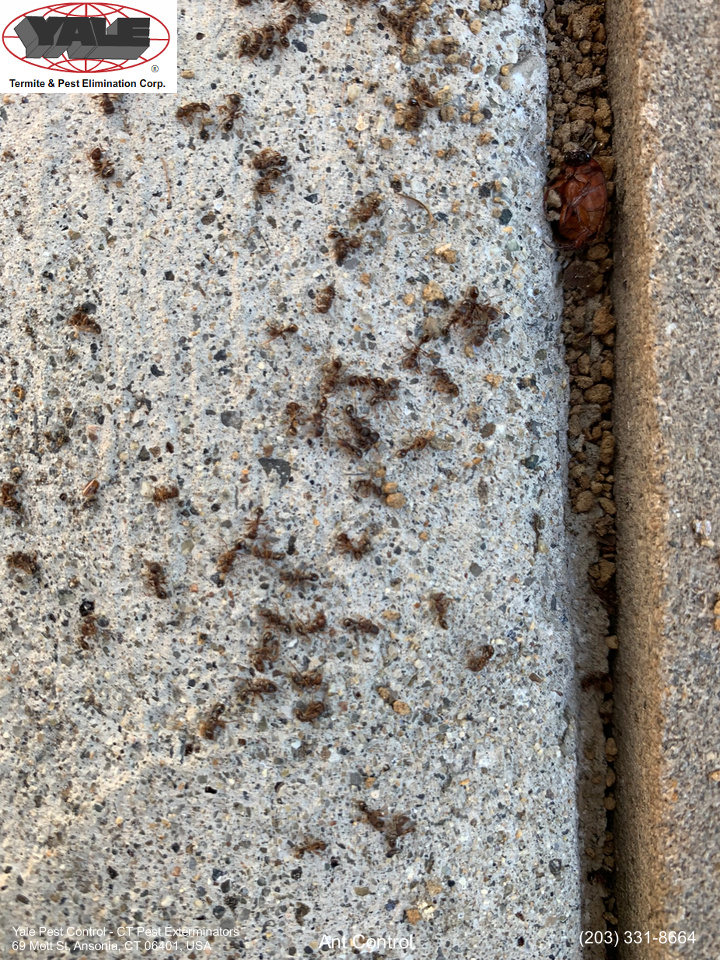
Several different species of ants can be discovered in a home, but only a small percentage of over 12,000 different species cause difficulties for homeowners. These popular species include anything from giant, dangerous carpenter ants to small, harmless pavement ants. Still, it might become concerning to see tiny pavement ants lingering around your property.
So how can you get rid of pavement ants that have been lingering for a week? Some ants are just looking for food or a place to live, while some can be more destructive than merely trying to survive. It’s important to have a clear understanding of what pavement ants are in order to prevent an invasion and large infestation. Knowing what they look like, how long they live, and what they do can help you get rid of them.
Pavement ants are among the most common pests, and due to their preference for sweet foods, they are also known as sugar ants. They are said to have originated in Europe, but they may also be found in many parts of the United States and around the world.
They’re called pavement ants because they build their nests beneath sidewalks. Pavement ants build mounds under floors, in landscaping, in roads, in a wall void, around water heaters, under concrete slabs and bricks, on garbage, in insulations, and the like.
Pavement ants are the ones you see invading sidewalk cracks, but you may also notice them crawling over your kitchen floor looking for grease spots, crawling over your picnic blanket, or tracking the scent of grilled food on your patio.
Outdoor pavement ant colonies are unlikely to cause any damage. But when this little ant decides to create an indoor colony, it becomes a nuisance pest you'll have to deal with. It’s important to learn how to differentiate pavement ants from other common ants, such as fire ants, carpenter ants, and argentine ants. All of which may cause a different kind of destruction, when compared to the tiny pavement ant.
Pavement ants are dark brown to blackish in color and measure 2.5 to 3 mm in length. Their body is divided into 3 sections: head, thorax, and legs. The head and thorax are darker, with parallel markings, while the legs and antenna are lighter. The antenna on a pavement ant's head contains 12 segments.
Pavement ants build their nest sites in the ground beneath stones, pavements, and crevices in building foundations. Pavement ants can build nests in a wall void indoors, usually in humid areas nearby a heat source.
Pavement ant colonies can grow to be fairly large, with up to 4,000 colony members and multiple queens. Winged ants of this species are commonly encountered in the spring. Swarmers from indoor colonies, on the other hand, can be found at any time of year.
Pavement ants thrive in their nest sites underneath or near cement slabs, patios, sidewalks, and driveways. Pavement ant nests can be found in the open or hidden beneath stones, pavement, brickwork, or wood. Worker ants use pipelines or cables to move upward from their ground-level nests.
Pavement ants create a problem in commercial buildings when winged ants emerge from gaps in walls above ceilings and descend into the rooms below. They are more common in residences near a heat source, such as a radiator or heating duct, throughout the winter.
Pavement ants consume decomposing matter, honeydew, sweet and greasy foods, meat, grasses, pet food, seeds, insects, and other organic stuff. When food is collected, pavement ant workers return to their ant nest in clear lines, maintaining their discipline as they do so. When they return to their nest sites, they use a stinger at the tip of their abdomen to produce a scent trail that guides other workers in finding the food source.
Workers, reproductive males, and winged females make up the caste system of pavement ants. The colony is looked after by the worker ants, who also look for food. Every pavement ant colony has multiple queens.
During the spring and summer, pavement ants mate. The queen lays eggs after mating, males die, and mated females drop their wings and travel to a new location to start a new pavement ant colony. In 40 to 60 days, the eggs mature into adult worker ants. Males responsible for reproduction die after a few months, although workers can survive up to 5 years.
While pavement ants don't damage the structure of the houses, large colonies of pavement ants can be both bothersome and unsanitary. These ants can eat and contaminate your food. Pavement ants can bring bacteria or viruses into your home through waste or leftovers. You can use many pest control strategies to eliminate them and avoid potential damage.
The sting of pavement ants poses little threat to humans. They have a calm attitude and are more focused on collecting food for their colonies. They can, however, sting if they feel threatened. Pavement ant stings can be mildly uncomfortable and cause irritation. In some situations, ant bites may trigger allergic reactions.
Outside, the pests establish an ant nest under rocks, logs, and pavement. cracks. Because the insects scavenge at night and dwell under floors and inside walls, pavement ant colonies are much more challenging to detect indoors. There are several unmistakable indicators of pavement ant infestation, such as:
While pavement ants are naturally attracted to outside paved areas such as sidewalks, roads, and concrete, they can also invade your property through cracks and crevices in concrete, such as foundations, slabs, and door jams.
Warmth and moisture are enticing to pavement ant colonies. You'll most likely encounter these ants in these parts of your home if you have them.
Food sources, particularly those providing sugar and protein, often including honey, nuts, cheese, bread, jam, cookies, and crackers, are the main things that pavement ants hunt for inside a home. Grease, pollen, pet food, plant nectar, trash, and even other dead insects are all consumed by these ant species.

Several chemical and natural strategies can be used to manage pavement ant infestations. If you want to eliminate the entire colony of pavement ants, ant bait is the most efficient way out of all of the methods. It is important to seal all cracks, crevices, and potential ant nests after employing any of these methods to avoid re-infestation of pavement ants.
Ant baits are one of the most effective methods to get rid of a pavement ant infestation. Slow-acting baits may take a while to show results, but they are quite effective. Sugar-baits, fat-based baits, and protein-based baits are among the several types of baits available on the market.
Dust and insecticide sprays will disperse and kill the worker ants fast, preventing them from returning to their ant nest. In the event the queen survives, the colony will thrive and eventually multiply. When you successfully lure ants using ant bait, they will transport the bait to their nests. This ant bait will then be consumed by the queen and workers, resulting in the destruction of the whole colony.
Pavement ants are managed with a variety of interior and outdoor insecticide sprays. Instructions and labels are included with these sprays, and you'll be able to achieve good results by following the company's guidelines. Spray the cracks, fissures, holes, and ant mounds with the insecticide spray.
Homeowners can opt to choose from numerous ant control methods for eradicating infestations. Although professional exterminators may be required in some circumstances, there are several natural alternatives that can eliminate ant activity without introducing chemicals or poisons into your home. If you don't want to utilize chemical methods to get rid of the pavement ants, try the following ant control solutions
Getting rid of ants can be quite challenging, especially if there is an active infestation. It's advisable to contact an exterminator if you've experienced several ant infestations, especially stinging or wood-destroying ants. Homemade ant treatments might drive them deeper into the wall voids or under the foundation, so it's crucial to seek professional ant removal services as soon as possible.
Eliminating these pests may appear overwhelming without the right training and equipment. Ant problems, no matter how minor, can become worse if not addressed properly. The best approach to handle the problem is to contact a licensed specialist, who can also provide guidance on how to avoid future ant infestations.
The final phase of extermination is to prevent ants gaining access to your household. Preventing pavement ants from entering your home is your best defense. Ant activity in your property can be deterred by removing possible attractants. To prevent another pavement ant infestation, take the following measures.

A variety of ant control solutions can be used to get rid of different species of ants. It's crucial to be able to identify them, so you can keep the ant colony from expanding or infesting the rest of your home. When you discover an insect in your area, it's important to develop the appropriate pest control strategy to save you time and money. But if your household insect infestations have gone out of hand, it's time to hire an experienced pest control company.
At Yale Pest Control, we ensure that the entire ant colony is eradicated from your property, with the option of developing a treatment plant to avoid future infestations. Apart from ant infestations, we have a high level of expertise dealing with pest problems of all kinds, such as mosquitoes, termites, roaches, and bed bug colonies. If you want to learn more about our services and all the other pests we can eliminate, schedule a consultation with us today.